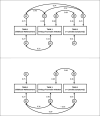Phenotypic and familial associations between childhood maltreatment and cannabis initiation and problems in young adult European-American and African-American women
- PMID: 28779616
- PMCID: PMC5599374
- DOI: 10.1016/j.drugalcdep.2017.06.038
Phenotypic and familial associations between childhood maltreatment and cannabis initiation and problems in young adult European-American and African-American women
Abstract
Background: Childhood maltreatment is a known risk factor for cannabis initiation and problem use, but the extent to which this association is attributable to shared familial influences is unknown. We estimate the magnitude of associations between childhood maltreatment, timing of cannabis initiation, and cannabis-related problems, in European-American (EA) and African-American (AA) women, and parse the relative influence of additive genetic (A), shared environmental (C), and individual-specific environmental (E) factors on these constructs and their covariation.
Methods: Data were from diagnostic telephone interviews conducted with 3786 participants (14.6% AA) in a population-based study of female twins. Logistic regression analyses and twin modeling were used to test for associations, and estimate the relative contributions of genetic and environmental influences to childhood maltreatment and cannabis outcomes and their covariation.
Results: Maltreatment was significantly associated with increased likelihood of cannabis initiation before age 15 among EAs (OR=6.33) and AAs (OR=3.93), but with increased likelihood of later initiation among EAs only (OR=1.68). Maltreatment was associated with cannabis problems among both groups (EA OR=2.32; AA OR=2.03). Among EA women, the covariation between maltreatment and cannabis outcomes was primarily attributable to familial environment (rC=0.67-0.70); among AAs, only individual-specific environment contributed (rE=0.37-0.40).
Conclusion: Childhood maltreatment is a major contributor to early initiation of cannabis as well as progression to cannabis problems in both AA and EA women. Distinctions by race/ethnicity are not in the relative contribution of genetic factors, but rather in the type of environmental influences that contribute to stages of cannabis involvement.
Keywords: Cannabis initiation; Cannabis problems; Childhood maltreatment; Heritability; Race/ethnicity; Twins.
Copyright © 2017 Elsevier B.V. All rights reserved.
Conflict of interest statement
No conflicts to declare.
Figures

Similar articles
-
The genetic relationship between cannabis and tobacco cigarette use in European- and African-American female twins and siblings.Drug Alcohol Depend. 2016 Jun 1;163:165-71. doi: 10.1016/j.drugalcdep.2016.04.011. Epub 2016 Apr 16. Drug Alcohol Depend. 2016. PMID: 27114204 Free PMC article.
-
Genetic and environmental contributions to initiation of cigarette smoking in young African-American and European-American women.Drug Alcohol Depend. 2015 Dec 1;157:54-9. doi: 10.1016/j.drugalcdep.2015.10.002. Epub 2015 Oct 16. Drug Alcohol Depend. 2015. PMID: 26482091 Free PMC article.
-
Childhood Trauma and Two Stages of Alcohol Use in African American and European American Women: Findings from a Female Twin Sample.Prev Sci. 2018 Aug;19(6):795-804. doi: 10.1007/s11121-017-0838-5. Prev Sci. 2018. PMID: 28875252 Free PMC article.
-
Cannabis or alcohol first? Differences by ethnicity and in risk for rapid progression to cannabis-related problems in women.Psychol Med. 2013 Apr;43(4):813-23. doi: 10.1017/S0033291712001493. Epub 2012 Jul 18. Psychol Med. 2013. PMID: 22804877 Free PMC article.
-
Genetic and environmental influences on cannabis use initiation and problematic use: a meta-analysis of twin studies.Addiction. 2010 Mar;105(3):417-30. doi: 10.1111/j.1360-0443.2009.02831.x. Addiction. 2010. PMID: 20402985 Free PMC article. Review.
Cited by
-
Racial differences in early adolescent substance use: Child abuse types and family/peer substance use as predictors.J Ethn Subst Abuse. 2024;23(1):110-127. doi: 10.1080/15332640.2022.2068720. Epub 2022 May 5. J Ethn Subst Abuse. 2024. PMID: 35510907 Free PMC article.
-
Trauma exposure among cannabis use disorder individuals was associated with a craving-correlated non-habituating amygdala response to aversive cues.Drug Alcohol Depend Rep. 2022 Sep 29;5:100098. doi: 10.1016/j.dadr.2022.100098. eCollection 2022 Dec. Drug Alcohol Depend Rep. 2022. PMID: 36844163 Free PMC article.
-
Psychosocial moderation of polygenic risk for cannabis involvement: the role of trauma exposure and frequency of religious service attendance.Transl Psychiatry. 2019 Oct 21;9(1):269. doi: 10.1038/s41398-019-0598-z. Transl Psychiatry. 2019. PMID: 31636251 Free PMC article.
-
The association between child maltreatment and problematic alcohol use in adulthood in a large multi-ethnic cohort: the HELIUS study.Epidemiol Psychiatr Sci. 2022 Dec 9;31:e87. doi: 10.1017/S2045796022000695. Epidemiol Psychiatr Sci. 2022. PMID: 36484150 Free PMC article.
References
-
- Afifi TO, Henriksen CA, Asmundson GJ, Sareen J. Childhood maltreatment and substance use disorders among men and women in a nationally representative sample. Can. J. Psychiatry. 2012;57:677–686. - PubMed
-
- American Psychiatric Association. Diagnostic and statistical manual of mental disorders. 4. Washington, DC: 2000.
-
- Bensley LS, Spieker SJ, Van Eenwyk J, Schoder J. Self-reported abuse history and adolescent problem behaviors. II. Alcohol and drug use. J. Adolesc. Health. 1999;24:173–180. - PubMed
-
- Bidarra ZS, Lessard G, Dumont A. Co-occurrence of intimate partner violence and child sexual abuse: Prevalence, risk factors and related issues. Child Abuse Negl. 2016;55:10–21. - PubMed
MeSH terms
Grants and funding
LinkOut - more resources
Full Text Sources
Other Literature Sources

